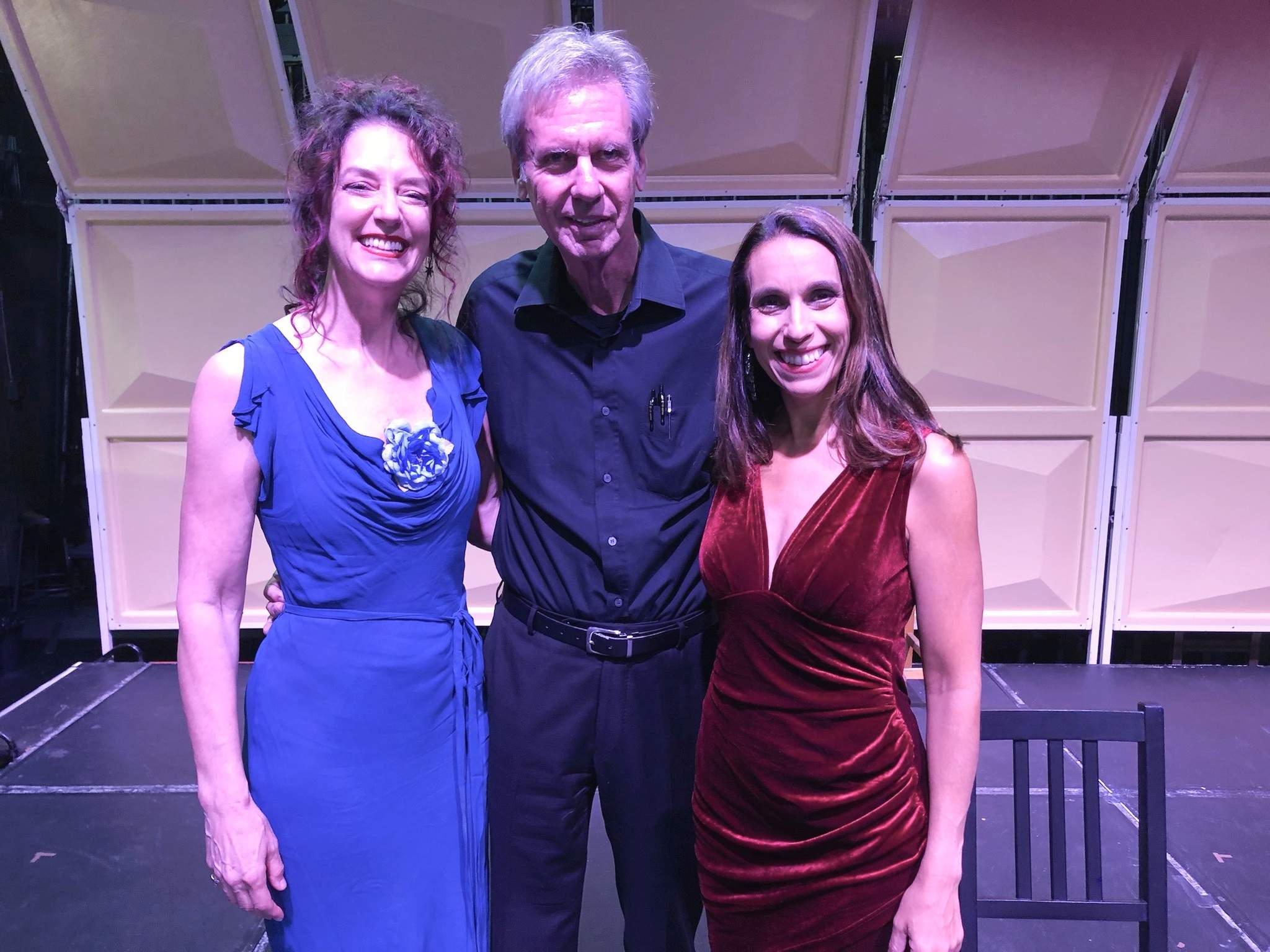Left to right: Valentina Osinski, Paul Smith, and Sibel Demirmen Stripped to the bone but rich with flavor, Contemporary Opera Marin’s program “It’s All About Mozart,” presented July 17, 2022 on the stage of the College of Marin’s James Dunn Theater, was positively alchemical. Two works for chamber opera ensemble were performed by four soloists, nine choristers and an orchestra of equal number on a bare stage with minimal lighting, few props, and costumes off the rack. That’s the pattern (along with free admission and parking) of many Contemporary Opera Marin productions, a no-frills, enlightening musical experience. It could be said that chamber opera is to grand opera as short stories are to literature: condensed, tasty entities that delight and surprise.
This summer represents a fresh flowering for Contemporary Opera Marin as they resume performances following a long pandemic hiatus, each conducted at the piano by the venerable Paul Smith. They’re presenting an intense series of chamber operas and mini-operas that range from comic to tragic, frothy to profound, obscure to well-loved.
July 15 through 17 featured two operas with Mozart as subject matter: Rimsky-Korsakoff’s Mozart and Salieri (1897) and Judith Weir’s 1991 opera Scipio’s Dream. Rimsky-Korsakoff lifted the libretto for Mozart and Salieri straight from Pushkin’s 1830 verse drama, which was also the inspiration for the 1984 film Amadeus. He portrays Salieri as realizing that no matter his stature in Vienna’s music world, there is another with greater genius. The clueless source of his jealousy is Mozart. The Pushkin drama, written five years after Salieri’s death, presents the eclipsed toast of Vienna consumed by jealousy of the “vulgar peasant” who is touched by the Divine, and he plots the younger composer’s murder.
Sung by the fine basso Michael Mendelsohn, Salieri has the stage to himself as he relates his grievances – the arduous years of honing his craft and the coming to a new creativity at the time he realizes his art is eclipsed. Mr. Mendelsohn, recently recovered from Covid 19 and for that reason on book in this performance (the ensemble will take the production soon to London), laid out his history compellingly, interrupted by the charismatic tenor Michael Orlinsky as Mozart, who bounds in with puppy energy.
Sporting a Hippie-ish blue shirt that matches his eyes and a decorated Indian vest, he sings of his supposed friendship with Salieri, and plays at Salieri’s request a tune from a new composition. Or rather, Mr. Orlinsky picked up a guitar and mimed playing as Pam Otsuka, in the part of a blind violinist who amuses Mozart, came on stage to play a charming melody. Mr. Mendelsohn’s Salieri laments to himself, “His genius makes me feel as if I’ve failed,” and with nefarious intent, he invites Mozart to dinner.
In the second scene, the two men meet in a restaurant. Mr. Orlinsky’s Mozart appears subdued. He sings affectingly of a man in black who came to him demanding a requiem mass, and confesses, “I’ve never written music this way—I see his face, that somber man in black.” As he air-conducts, the members of the Chorus (doubling as waiters in the restaurant) sing some glorious bars from Mozart’s Requiem, moving Salieri to tears, and he sings to himself: “This music fills your soul with joyful sorrow.” As the poison Salieri has surreptitiously dripped into Mozart’s cup begins its deadly work, the choristers, one by one, come forward to drape black cloths over Mozart’s slumped figure, covering up the crime. In the end, Salieri too is destroyed, though he will live many years more.
Scipio’s Dream is British composer Judith Weir’s radical re-composition of Mozart’s three-hour opera Il Sogno di Scipione, which in turn is based on Cicero’s writings about Scipio Africanus, the great Roman general. The piece is divided into three scenes, and Scipio (Mr. Mendelsohn) is a drudge, an office worker visited by two goddesses who appear to him as he works at his computer: “Fortune,” portrayed by coloratura soprano Sibel Demirmen in a sexy red dress, and strong and steadfast “Constancy,” sung by mezzo-soprano Valentina Osinski, equally stunning in a clingy blue frock. Tugging for his soul, each goddess urges, “Come away with me, my hero…choose one of us.” There’s a lot of humor in the battle of the sirens, especially as Ms. Demirmen vamps, grabbing Scipio by the tie and flinging him about.
There’s a lot of Mozart’s music inserted in this caprice in lovely bits, and Ms. Demirmen’s voice was as supple as her fluttering eyelashes. Ms. Osinski’s singing was more demure as she urged Scipio to choose the eternal verities and led him in a staid ballroom dance. The whole thing is a modern bow to Baroque opera, full of camp and humor, recitatives without the arias. All the voices were a joy to hear.
Constancy transports Scipio to Heaven and they peer at Earth from above, and Scipio meets his dead grandfather (Mr. Orlinsky) who gives him grandfatherly advice. Finally, Scipio chooses Constancy, and the infuriated Fortune casts him down to Earth, creating a tempest (the Chorus with noisemakers).
The final scene finds Scipio back in his office, alone and falling asleep over his computer, exhausted from his travels. At this point the fourth wall fell as the Chorus thanked the audience for their constancy, and the audience reciprocated, roundly applauding the soloists and Chorus, whose members had played its many roles – Mayra Chachkin, Jane Harrington, Don Hodges, Michael Irvine, Vicki Marinko, Lisa Nyquist, Kim Rivera, Mariel Rowles, and Peter Sorensen. Each member of the orchestra, too, was appreciated: Carol Adee, flute; oboist Mariel Rowles; Mary Kruzas, clarinet; Ali Gainey, bassoon/clarinet; violinists Joanna Pinckney and Ms. Otsuka; cellist Ms. Chachkin; and Mark Culbertson, contrabass.
Published at classicalsonoma.org July 22, 2022 Photo by Potter Wickware
|
